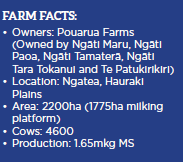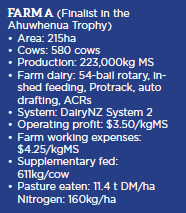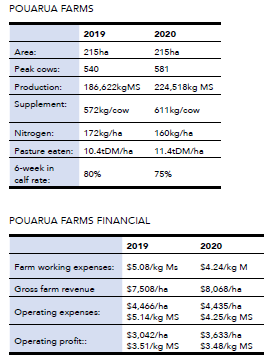Ahuwhenua Trophy finalists Pouarua Farms are farming a large block of peat soil in Hauraki Plains using minimal cultivation techniques, investing in carbon sinks, retiring poor-performing land and diversifying land use to best look after their whenua (land) – which they’ve only recently got back. Sheryl Haitana reports.
 Hauraki iwi who went through years of Treaty of Waitangi negotiations to eventually buy back their own land, are now balancing social, cultural and economic prosperity for their people while caring for and restoring their whenua.
Hauraki iwi who went through years of Treaty of Waitangi negotiations to eventually buy back their own land, are now balancing social, cultural and economic prosperity for their people while caring for and restoring their whenua.
Five iwi, Ngāti Maru, Ngāti Paoa, Ngāti Tamaterā, Ngāti Tara Tokanui and Te Patukirikiri, were compensated in 2013 with the largest on-account Treaty Settlement ever made by the Crown.
They collectively acquired Pouarua Farms in 2013 – some 2200 hectares on the Hauraki Plains, comprising 10 farms – nine dairy units and one drystock unit.
The farms were initially in a 50:50 sharemilking agreement with Landcorp, but have been fully operated by the iwi owners since 2019.
Pouarua Farms chief executive Jenna Smith came onboard at the transition and has helped steer the farms toward higher profitability, while improving the environmental footprint in the last few seasons. They hit record profit last year while managing to lower both their nitrogen loss and greenhouse gas numbers.
One of their dairy farms, Farm A, which Pouarua entered in the Ahuwhenua Trophy, recorded an 18% increase in per cow milk production to 390kg milksolids (MS)/cow in the 19/20 season and a 20% increase in per hectare production to 1034kg MS despite a significant drought.
Farm A has a nitrogen surplus of 106kg/ha and is emitting 9128kg CO2e/ha.
“We dropped our stocking rates significantly and focused on the basics. We have had a reasonable growth phase and we are fine tuning our operations now,” Jenna says.
Jenna’s job involves ensuring peak performance, while also looking at new ventures for the iwi land and hitting targets that meet Pouarua’s strategy, which vary from profitability to connecting with their community.
She has been involved with investment farming for years and was excited to work for an iwi company where there was an intergenerational view of the land.
“I really like iwis’ long-term take on farming, it’s still profit focused, but there are equal values on doing what is right for the land and the people.
“It’s refreshing to have other drivers than profit.”
Planting on peat
Pouarua Farms embodies the practice of ‘Kaitiakitanga toku whenua: to return the land, once lost, to our iwi and to care for the land, forever!’.
Farming on peat is a concern and will be a challenge , but one they feel confident to meet, Jenna says.
“We have challenging soils and carbon emissions are probably one of our biggest challenges. We are not ever waiting for regulations to come to us, we are trying to get ahead and look after the whenua.
“We are looking at other options, and by doing what the land is capable of, rather than trying to make the land capable of something it’s not.”
Pouarua Farms has just planted a 9ha canopy blueberry orchard, the largest canopy orchard in the North Island, which they intend to grow to 20ha within the next two years.
This year they also put some of the dairy platform into food-grade grain, which meets another of the iwi’s strategies to feed people, through suitable use of the land.
They retired 25ha on one of the dairy farms to a carbon sink. The area was converted about 15 years ago, but never performed up to standard, so it made sense to revert the land to native species, Jenna says.
They are looking for other areas on their dairy platforms which will be suitable to retire and are working closely with Maanaki Landcare and Waikato Regional Council on peat soil trials.
Cultivation techniques are another key focus with cropping a regular practice across the milking platforms.
Pouarua grow turnips in summer, which are direct-drilled in and then they direct drill sorghum to provide cover.
“If we get a dry summer the turnips could be finished by late January/early February and may not be back in grass until late April.”
The sorghum sown behind the turnips makes sure the land is not bare for too long to minimise carbon loss. It also supplies an extra 4-5 tonnes of feed, Jenna says.
This season they have planted a couple of paddocks with up to nine species to do an informal trial of regenerative planting to see how that stacks up.
A forever planting plan also sees about 7500 plants (Harakeke (flax) and other native species) planted annually across the entire platform. Riparian planting of the drains is the main priority.
They’ve just completed their first five-year planting plan which had 53,000 plants go in the ground. They work with the council to make sure they are hitting the hot spots first, Jenna says.
Specific species are planted in cultural gardens to utilise in weaving, medicines, food (honey), bird habitat, water quality, soil conservation and landscape improvement.
“That is one good thing peat is for is growing, Harakeke. The weavers love it, they can come and harvest their Harakeke that they need. We’re identifying different areas now, so we will have different areas where they harvest Harakeke for kete bags, and another corner for art, as they have different textiles.”
Connecting the people to the land
 Entering the Ahuwhenua Trophy and hearing the stories from the other finalists, highlighted how closely other iwi were connected with their community.
Entering the Ahuwhenua Trophy and hearing the stories from the other finalists, highlighted how closely other iwi were connected with their community.
“Because this land has only just been returned, and we have a large community to touch base with, it’s highlighted to me how much work we have to do there.”
During Covid-l9 lockdowns last year the farms started supplying food to the Manaaki Hub to go out to vulnerable whanau.
Their summer cropping this year will include sweetcorn and sunflowers to be included in the kai packs.
“With Covid there are about 7500 meals going out a week. We want to put in at least four or five proteins so that people can see a direct benefit from having their land.”
Eight of the dairy farms supply Synlait, with one now supplying Lewis Road Creamery with A2 Jersey milk, another product iwi can identify directly to their land.
Another way to connect with their community is Pouarua Farms has increased Maori employed onfarm from 21% to 42% this year.
With Covid and immigration changes, they lost 12 migrant workers, but were able to employ local people into those roles.
“We’ve employed 10 of those roles straight from the iwi – they’re all new to the industry, first-time farmers.
“They’ve all been able to come out and get jobs and connect with their land. So that’s been an awesome achievement this year.”
Pouarua Farms focuses on staff training and in recognition that the training is required by others, the farm is opened up to enable other farmers and staff to attend shared field days.
There is also a strong relationship with the local college. Project Papatūānuku educates secondary school students in practical farming methods on peat land, while at the same time they are gaining NZQA qualifications. Students are able to access the farm for this training and to carry out science experiments.
Being named a finalist in the Ahuwhenua Trophy competition was a huge achievement, considering how young the company still is, Jenna says.
“We are still so young in our journey, It was a really good chance to stop and be proud, we are up there amongst some of the best in the country.”
Entering the Ahuwhenua competition and holding up the trophy – whether it’s for dairy, horticulture, or drystock, is definitely on the plan going forward.





